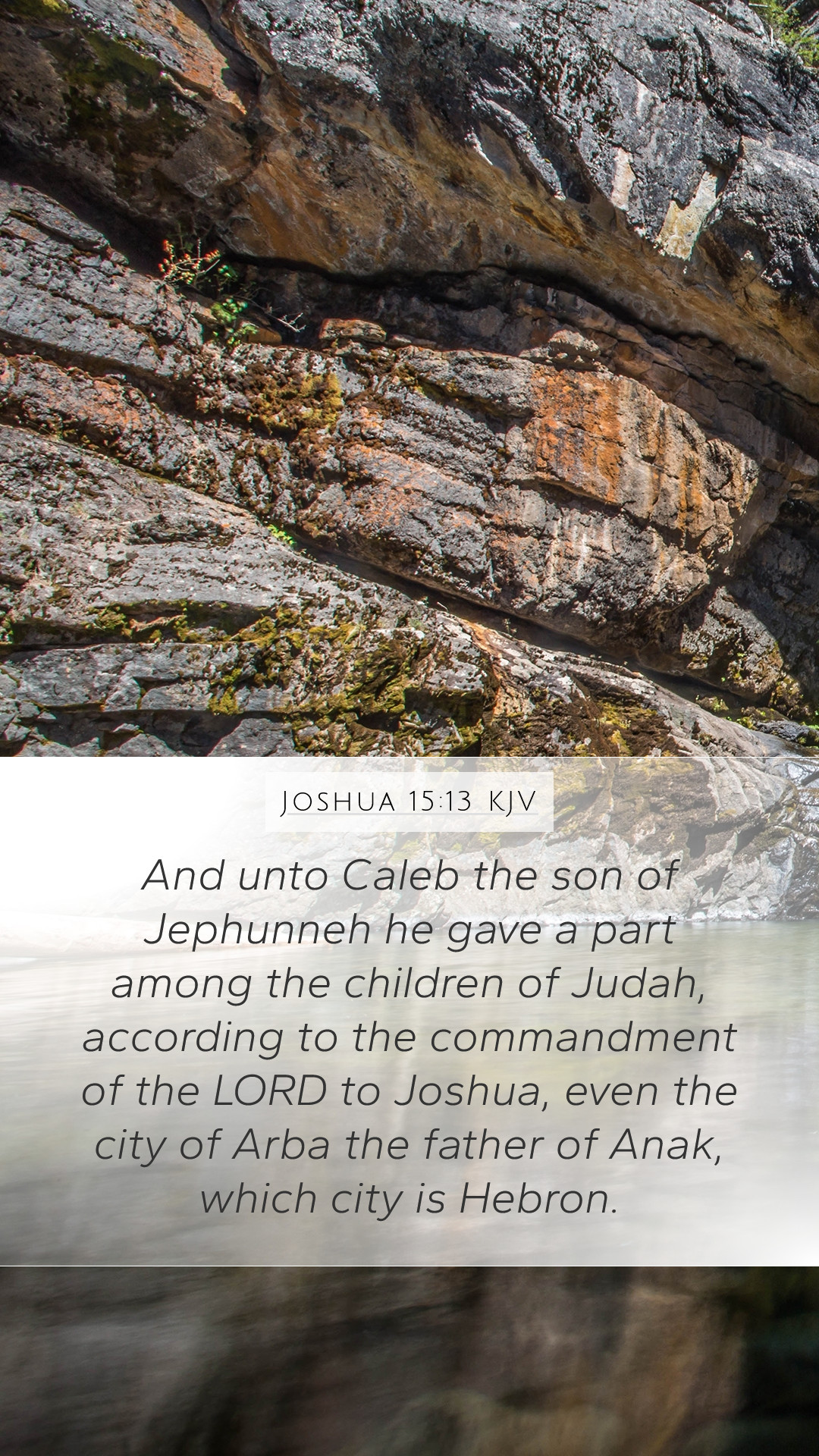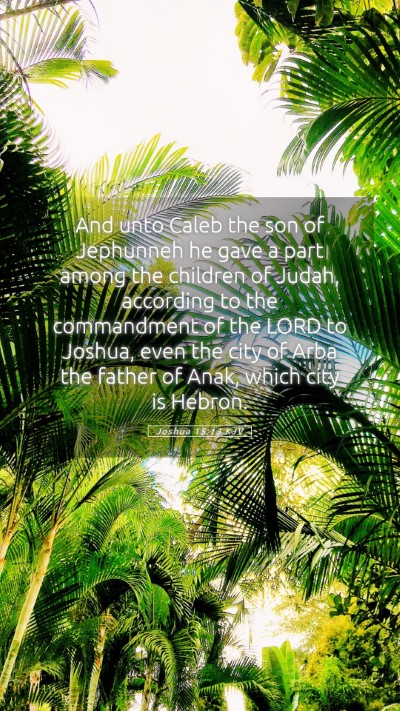Bible Verse Meaning: Joshua 15:13
Verse: Joshua 15:13 - "And unto Caleb the son of Jephunneh he gave a part among the children of Judah, according to the word of the Lord to Joshua, even the city of Arba, which is Hebron."
Overview: This verse describes a significant event in the division of the land among the tribes of Israel, specifically focusing on Caleb's inheritance. The selection of Hebron resonates with themes of faith, reward, and God’s faithfulness. Below is a detailed analysis that combines insights from renowned public domain commentaries.
Insights from Commentaries
Matthew Henry's Commentary
Matthew Henry highlights Caleb’s unwavering faith and courage, as exemplified in the Book of Numbers when he and Joshua were the only spies who trusted in God's promise of victory over the Canaanites. This verse indicates that God fulfilled His promise to Caleb by granting him the city of Hebron, which was originally known as the city of Arba. Henry notes that this city was significant not only for its ancestral background but also for its association with the patriarchs, thus emphasizing Caleb's rightful inheritance. Henry illustrates that the reward Caleb received was reflective of his faithfulness and the grace of God in honoring those who stand firm in belief.
Albert Barnes' Commentary
Albert Barnes focuses on the importance of the inheritance distributed among the tribes, showing how it correlates with God’s promises. Barnes explains that Caleb, a descendant of the tribe of Judah, received this special allotment due to his adherence to God and the role he played in the Exodus. He elaborates that Hebron was a site where both the past and future converge—significant as both a location of ancestral veneration and a place where the Israelites took possession of the land. This underscores a theme within biblical narratives of the importance of legacy, faith, and divine promise being made manifest in physical presence.
Adam Clarke's Commentary
Adam Clarke provides a more historical context, elaborating on the city of Hebron's relevance. He interprets its significance as being one of the oldest cities in the region, pointing out that it had been previously inhabited by giants (the Anakims). Clarke emphasizes that Caleb’s choice of this city reflects boldness and a reliance on God’s power, as it was a challenging territory to conquer. The emphasis Clarke places on the giants shows that while God’s promises are given, our faith is tested, and blessings come to those who trust and act upon God’s word despite opposition.
Subthemes for Deeper Understanding
This verse not only highlights individual faith through Caleb but reveals broader themes in Scripture.
- Faith and Perseverance: Caleb's 45-year wait for his inheritance symbolizes patience and unwavering faith in God’s promises.
- Divine Justice: The distribution of land reflects God's justice in rewarding faithfulness and bravery.
- Community and Legacy: Caleb's receiving of land is a reminder of communal identity, belonging to the tribe of Judah, and participating in the larger covenant community.
- History and Geography: Understanding Hebron’s historical and geographical significance enhances the verse's depth, linking it to the broader narrative of Israel's conquest and settlement.
Application and Reflection
The passage invites readers to reflect on what it means to trust in the promises of God and the rewards of such faith. It emphasizes how individual actions of faith can influence community outcomes, inspiring believers today to consider how they can take bold steps of faith in their lives.
Cross References
- Numbers 13:30-31: Caleb’s faith in the face of opposition when seeing the land.
- Deuteronomy 1:36: The specific mention of Caleb being promised the land because he wholly followed the Lord.
- Joshua 14:6-14: Details the request made by Caleb for his inheritance of Hebron and God’s promise keeping.
- Hebrews 11:6: Faith is highlighted as essential to pleasing God, linking to Caleb’s example.
Conclusion
This chapter and verse delve deep into themes of faith, obedience, and God's fidelity to His children. For those seeking a richer understanding of Bible verse meanings, interpretations, and commentaries, Joshua 15:13 serves as a poignant reminder that diligence and faithfulness are met with God’s blessings. Through personal exploration and study, whether in bible study groups or online bible study settings, individuals can uncover profound insights that relate ancient truths to modern life.
For deeper study, readers can utilize various bible study tools and resources designed to enhance understanding scripture, including lessons on applying Bible verses to daily life.


